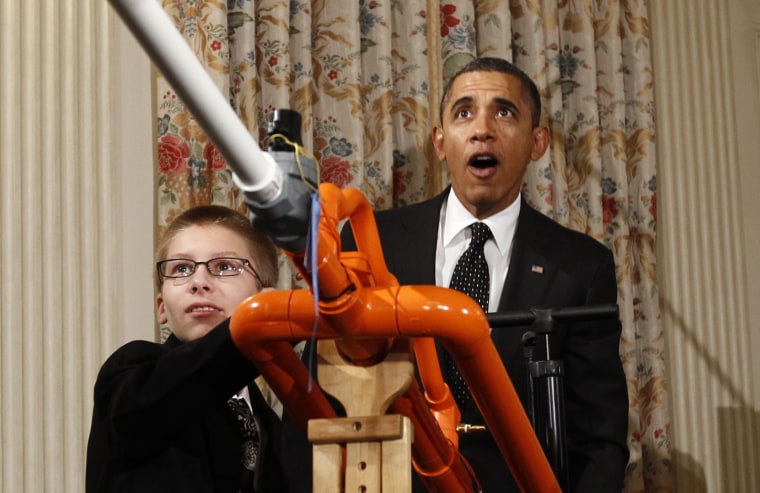In President Obama's
first inaugural address, he subtly acknowledged that support for science had lagged in the years before his election, but he also made a specific vow: "We'll restore science to its rightful place."
It's fair to say it's a promise on which he's delivered. In fact, the president
sat down with Popular Science recently, which noted Obama's record as a "very pro-science president," and asked, "Why do you see science and technology as being so important?"
"Science and technology helped make America the greatest country on Earth. Whether it's setting foot on the moon, developing a vaccine for polio, inventing the Internet, or building the world's strongest military, we've relied on innovative scientists, technologists, engineers, and mathematicians to help us tackle the toughest challenges of our time. [...] "We've expanded clean-energy research; we've launched major initiatives in advanced manufacturing, biomedicine, and strategic computing; we've increased preparedness and resilience against climate change; and we're training STEM [science, technology, engineering, and math] teachers so every child grows up with the skills they need to compete in the 21st century. Being pro-science is the only way we make sure that America continues to lead the world. Our policies reflect that."
Asked if he considers himself "a nerd," the president noted that his White House prepared a detailed paper on the Death Star, which he hopes means his administration has "at least a little nerd credibility built up."
Obama added, "What's remarkable is the way 'nerd' is such a badge of honor now. Growing up, I'm sure I wasn't the only kid who read Spider-Man comics and learned how to do the Vulcan salute, but it wasn't like it is today. I get the sense that today's young people are proud to be smart and curious, to design new things, and tackle big problems in unexpected ways. I think America's a nerdier country than it was when I was a kid-and that's a good thing!"
I remember a few months after Obama took office,
Time magazine published
a piece that said the president showed so much enthusiasm on science, he was "almost strident" on the issue.
The negative connotation of the phrase struck me as a mistake. The fact that Obama has demonstrated a real passion, in word and deed, in support of the sciences is something to be celebrated.
Indeed, two months after his first inauguration, when the president reversed the Bush/Cheney restrictions on stem-cell research, Obama issued a
memorandum addressing the importance of scientific integrity itself. The Associated Press
reported at the time:
"Promoting science isn't just about providing resources, it is also about protecting free and open inquiry," Obama said. "It is about letting scientists like those here today do their jobs, free from manipulation or coercion, and listening to what they tell us, even when it's inconvenient especially when it's inconvenient. It is about ensuring that scientific data is never distorted or concealed to serve a political agenda and that we make scientific decisions based on facts, not ideology." He said his memorandum is meant to restore "scientific integrity to government decision-making." He called it the beginning of a process of ensuring his administration bases its decision on sound science; appoints scientific advisers based on their credentials, not their politics; and is honest about the science behind its decisions.
And as long time readers
know, it wasn't long after that Obama also launched an annual White House Science Fair.
"If you win the NCAA championship, you come to the White House," the president said when announcing the event. "Well, if you're a young person and you've produced the best experiment or design, the best hardware or software, you ought to be recognized for that achievement, too. Scientists and engineers ought to stand side by side with athletes and entertainers as role models, and here at the White House we're going to lead by example. We're going to show young people how cool science can be."
I don't know who'll succeed him in the White House, but I do know it'll probably be a long time before we see a president as pro-science as Barack Obama.
